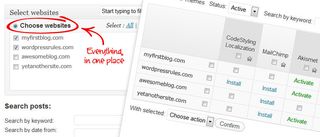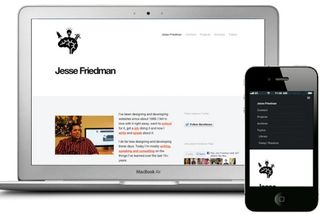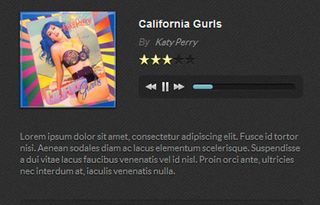The 11 biggest myths about WordPress
You may have the wrong idea about what WordPress can offer. Jessie Friedman puts you right...
Thousands of developers around the world are working to make WordPress better and bring it into the new web future. So it's a bit frustrating to build a 20,000 page directory that is secure, fast, reliable and easily editable, then hear a client tell us "Isn't WordPress just for blogging?". Here I'll explain why it's not, and nine other things commonly believed about WordPress that aren't actually true...
01. WordPress is just for blogging

WordPress is still commonly known as the blogging platform. I tend to blame WordPress for not moving forward fast enough on this. It was only recently that WordPress.org started referring to WordPress as "web software you can use to create a beautiful website or blog". You still get references to WordPress as blogging software as seen in Matt Mullenweg's bio for WordCamp San Francisco 2012 (above).
It's technically a marketing issue and one that will be fixed over time. The main thing is to realise is that WordPress' power is only limited by the person developing for it. There is a long standing joke between WordPress developers when we get asked by clients or novices "Can WordPress do..." and we answer "Yes" before they finish the question.
The reason is because WordPress is so extensible. Even before WordPress 2.9 and 3.0 (which brought us the biggest advancements towards becoming a full fledged CMS) we were still doing complex websites, directories, ecommerce stores and more. Essentially, all you need to know is that WordPress is fast, reliable, secure and powerful, and there's no reason it can't do what whatever you're dreaming up.
02. WordPress isn't suitable for big organisations and budgets

Following on from the outdate premise that WordPress is essentially a blogging platform, this myth is also very much behind the times. Today WordPress is all grown up and has so many tools and an amazing API that makes developing for it fast and scalable that we can't afford to exclude from being considered for bigger web projects.
You can check out WordPress VIP for a list of some of the biggest companies in the world using and relying on WordPress every minute of every day. Another area where there's been huge growth in the use of WordPress is universities. This is fantastic because school websites usually come with complex functionality and a need to manage and organise a great deal of integrated content.
03. WordPress doesn't provide support
WordPress is open source - how can it provide support? Well, if you're looking for an 800 number, you're right, it doesn't exist. However, the idea that you can't get support for a problem, bug or issue is just not true. No matter what level user or developer you are, there is a way to get answers to your questions.
Get the Creative Bloq Newsletter
Daily design news, reviews, how-tos and more, as picked by the editors.
The forums at WordPress.org are amazing, the codex has fantastic documentation and social networks play an important role too. My favourite place to get support is from the email lists. There are hackers, plugins and other email lists which you can subscribe to. Then when you have an issue, you email the group.
Typically I get answers to rather complex problems in minutes. This is also a great way for you to share your knowledge and experience and give back.
04. It's too difficult to manage multiple WordPress installations

If you have a lot of clients using WordPress hosted all over the place, it can be really difficult to manage all the updates from plugins, themes and the WordPress core. There are two solutions to this: one is a WordPress multisite install or network. This allows you to manage and host all of your WordPress websites in one place.
This can get a little messy if you don't take the time to plan everything, not to mention everything has to be on the same server and some of your clients may not want to move. I love WordPress Multisite and make a living off of it. However if that doesn't work for you, there is a great plugin called ManageWP that keeps track of all your WordPress installations and what maintenance they need all in one place.
05. WordPress isn't suitable for ecommerce
I totally understand the hesitation to use WordPress as an ecommerce system. WordPress wasn't made to manage products and stores. But here's a little secret: may other CMSs made specifically for creating online stores aren't actually very good.
If it was still 2010 I'd probably suggest that you don't use WordPress for an online store unless you were selling a few products or tickets to an event. But today, there are countless plugins and frameworks that transform WordPress into a reliable and easy to use ecommerce solution. Take a look at Jigoshop or WP e-Commerce, and I think you'll be pleasantly surprised.
06. WordPress can't be responsive

I hear all the time that WordPress can't support advanced web functionality but that just doesn't make sense. If you build your theme to be responsive it will be. Themify.me does a great job of developing responsive WordPress themes and there are hundredds more out there. I myself developed a plugin that aims to make it easy for user admins to manage content and maintain responsive integrity.
07. You can't do anything out of the box
I've said this so many times in so many classrooms, webinars and conferences. But it's not true: WordPress can do and be anything you want it to do and be. Your themes, in the end, output HTML markup. So the only thing that is different between WordPress and a static site is that WordPress sites get their content from a database.
It's your job to use WordPress to convert database content into HTML markup. Once that's done you can have fun with jQuery, backbone.js or even turn your site into a mobile app.
I have a friend, Aaron Ware, who runs Linchpin Agency, which actually made a WordPress powered Flash website. Don't let misconceptions prevent you from making awesome and powerful websites.
08. WordPress plugins are dodgy

There's some truth to this: you should hesitate before putting someone else's code into your system. The fact is that not all WordPress plugins are created equal. There are bugs, outdated code and flat out problems. You should do your due diligence and make sure what you're using is well done, supported and highly rated.
When you're in the WordPress Plugin Repository make sure the plugins you're looking at have a good amount of downloads, have been recently updated, supports your version of WordPress and in the end read through some code to make sure stuff isn't broken. You can always google for reviews of these plugins as well.
09. Open source software isn't suitable for big business
I get why big companies are nervous about this. However, just because I understand it doesn't mean I agree.
Most enterprise level companies have this feeling that they have to spend money on a system or software in order to use it: "If it's free, it isn't good enough or doesn't provide enough support". But here's the thing, the money you'd spend on a proprietary system can go to hiring one of the thousands or WordPress developers to support and build your system.
One major benefit of open source is that you have a community of people working to improve and fix the product rather than waiting on a team of people to do it. Not to mention you can always do it yourself. In the end these companies can aleviate their itch to spend money on software by contributing to the WordPress Foundation.
10. WordPress isn't secure

Secure is a relative term, and no system is perfect. Here's the deal, WordPress is powering 10x more sites than most CMSs combined. If you're a hacker, are you going to spend your time learning the vulnerabilities of less common CMSs or the one that will reap the most results? This doesn't mean that WordPress is less secure, just more likely to get attacked.
In my experience the absolute number one reason why a site is able to get hacked is because of poor password creation. WordPress can be the most secure CMS on the planet and if your credentials are admin clientname14 you are still going to get hacked. If you create difficult passwords, take the security measures I stated above and keep WordPress up to date you're far less likely to ever get hacked. Here are some other resources on securing WordPress:
- Protect your WordPress site with .htaccess
- 15 ways to increase your WordPress' security
- Secure WordPress advanced
11. WordPress doesn't need our support
Speaking of giving back, another common myth is that you don't need to, or can't, contribute to making WordPress better. In fact, there are so many ways to contribute that I had to dedicate an entire chapter to it in my book, Web Designer's Guide to WordPress. In chapter 20 I cover ways of contributing from donating to your favourite plugin, to writing in the codex, translating the WordPress admin, to building themes and plugins and much more. There are so many ways to give back and the more we do the better WordPress will get.
Conclusion
WordPress is doing just fine and is moving along nicely. It has a great deal of market share and a huge community preparing WordPress for the future. However, it would be nice to see WordPress used to its fullest potential more and more.
All too often I say "Why aren't you just using WordPress for this project?" and I hear back "Umm... I don't know, can WordPress do this?". Almost instinctively face meets palm, but after that I realise that it's on us to help the world understand what you really have here and what WordPress really can be.
Let me know your thoughts in the comments below or tweet me @professor. And don't forget to grab the Web Designer's Guide to WordPress, a book written, by me, specifically to help you build on your HTML and CSS skills to develop WordPress themes.
Words: Jessie Friedman
Liked this? Read these!
- Create your own WordPress toolkit
- Brilliant WordPress tutorials
- The best free WordPress themes
- How to futureproof your responsive WordPress website
- The best WordPress plugins for designers
- Top WordPress resources
What do you have to say about WordPress? Tell us in the comments!

Thank you for reading 5 articles this month* Join now for unlimited access
Enjoy your first month for just £1 / $1 / €1
*Read 5 free articles per month without a subscription

Join now for unlimited access
Try first month for just £1 / $1 / €1
The Creative Bloq team is made up of a group of design fans, and has changed and evolved since Creative Bloq began back in 2012. The current website team consists of eight full-time members of staff: Editor Georgia Coggan, Deputy Editor Rosie Hilder, Ecommerce Editor Beren Neale, Senior News Editor Daniel Piper, Editor, Digital Art and 3D Ian Dean, Tech Reviews Editor Erlingur Einarsson and Ecommerce Writer Beth Nicholls and Staff Writer Natalie Fear, as well as a roster of freelancers from around the world. The 3D World and ImagineFX magazine teams also pitch in, ensuring that content from 3D World and ImagineFX is represented on Creative Bloq.
